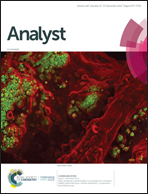Rapid detection of Group B Streptococcus (GBS) from artificial urine samples based on IFAST and ATP bioluminescence assay: from development to practical challenges during protocol testing in Kenya†
Abstract
We report the rapid detection (20 min) of Streptococcus agalactiae, Group B Streptococcus (GBS) employing on-chip magnetic isolation of GBS based on immiscible filtration assisted by surface tension (IFAST), followed by detection of the isolated GBS using an adenosine triphosphate (ATP) bioluminescence assay. Up to 80% GBS cells were isolated from spiked artificial urine samples with linear responses of bioluminescence signals from isolated cells at 2.3 × 102–9.1 × 105 CFU mL−1, demonstrating great promise for point-of-care detection of pathogenic bacteria in screening urine samples from pregnant women. Practical challenges during initial testing of the developed protocol with urine samples in Kenya are also described.



 Please wait while we load your content...
Please wait while we load your content...